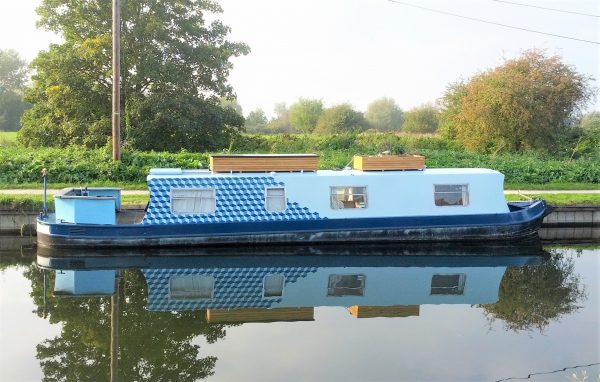Tips on buying a boat, particularly a narrowboat. It is a big decision, and it can feel like the Wild West out there, especially if it’s your first. It’s hard to know what to look for, who to trust, and what to prioritize. Emotional decisions are far more prevalent in boat buying than house buying, and there’s little real regulation to keep buyers safe.
Disclaimer: The following is purely opinion and represents my personal experience with boats I’ve seen over my years working on the waterways. I am not a surveyor, and neither I nor Cluett Carpentry Ltd accept liability for any decisions made in purchasing a boat. Remember, buying a boat is Caveat Emptor, and it’s strongly recommended that you get a full survey before any purchase.
I’ve seen hundreds of boats in my working life. Here are my thoughts on what to look for to get the best start in a life afloat.
Finding a Boat
Get on Apollo Duck and the marina websites to compare what’s out there. You’ll get a good sense of the market and what your budget will get you before you even set foot on a boat.
Don’t be too firm on essentials until you’ve lived on a boat. Is that trad stern you’ve set your heart on really what you want? Personally, I find them awkward for practical usage—give me a good cruiser stern any day, but everybody is different.
Be wary of outliers. Project boats (especially with wood or GRP tops) and older hulls can seem like bargains, but there’s a reason they’re cheap. Often you’ll spend more than you save within a year and have a boat worth less than you’ve spent. A sound hull, decent engine, and metal cabin are the real non-negotiables for me.
Anything older than 30 years and you’re potentially into overplating territory. If it isn’t done well, then the hull may still be rotting away, with water trapped between two skins of steel. Even over plated, an older boat will have significantly less value than a newer hull, which is worth considering before putting a lot of resources into refitting.
Hull age, length/beam, price, and engine should be the first things listed on any ad. A little “much beloved home, selling with a heavy heart” is fine, but it’s not really relevant. BSS is BS and, in my opinion, not worth the paper it’s written on for determining a boat’s viability. It’s not like an MOT for a car—it guarantees almost nothing for you. Many rotten boats still have a BSS, it is no kind of guarantee!
Finally, unless you’re prepared to spend twice as much and take three times as long as planned, be very careful when considering a project boat or sail away. If you can do the work yourself, great. If you’re paying someone, it’ll cost far more than buying a boat that’s ready to go and just needs minor alterations.
Viewing a Boat
First off, red flags:
- Damp smell
- Mould
- Wet/damp cabin bilge or very rusty bilge (i.e., was wet often/recently)
- Spongy/bouncy floor
Be very careful of a boat with any of these. If you’ve got a hull rusting from the inside and a rotten subfloor, or black mould on the back of wall linings, it’s potentially time for a full refit. Very expensive and a lot of work.
If you’re tall, check headroom before viewing. If you’re bending over to move about, question whether that’s sustainable.
Beware of “small jobs” left to do on cheaper boats. These ring alarm bells—small jobs often take much longer than expected and turn out expensive. If they’re that small and easy, why hasn’t the seller done them?
Buying a Boat
You’re ready to make an offer. I feel people rarely pay the asking price on a boat. Don’t go crazy, but it’s worth trying for a bit off.
Expect the seller to take you out on their boat either before or after a deposit is paid, but before the out-of-water survey. You’ll see the engine running and get a sense of the boat in action, plus it’s crucial for the seller to show you how everything works—electrics, heating/hot water, isolators, and more. Boats aren’t uniform, and if you don’t find out now, you may spend ages wondering how things work.
Finally, and most importantly: you absolutely must get an independent surveyor of your choice to do an out-of-water hull survey. A full survey (rather than just hull) is great but check what it covers. No fault of the surveyors, but some people think a full survey covers more than it does. If you aren’t paying specifically for detailed electrical inspection, you’re probably not getting it.
Final Thoughts
Don’t be afraid to ask questions. Lead with your head, not your heart. Boats are an emotional purchase—much more so than houses—but a cute interior may be hiding trouble for later.
There are lots of great folk on the water, but also some rogues, so speak to a range of people and get all the advice you can. The boating community is welcoming and friendly, and lots of people will help you out just to be kind.
Good luck finding the perfect boat. May you have many years of happy cruising ahead of you.



I am glad I read this before I bought a boat. I am just starting out in my search for one, and now I feel a bit more empowered to do so. Thank you so much.